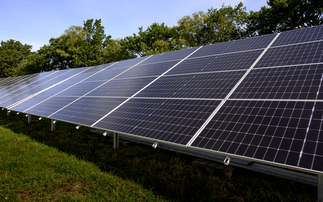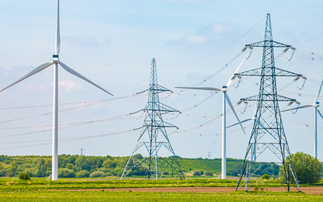The government has said it wants to make the UK one of the world's most resource efficient economies, but can this admirable ambition survive the turbulence unleashed by Brexit?
Like the proverbial onion, the challenge presented by Brexit in one of many layers, each one more pungent than the last. It is a veritable lasagne of legal complexity, a Battenberg cake of constitutional misery, and we are not even close to navigating all the layers yet. Indeed, more layers keep getting added, like playing jenga, on a trampoline, with a small handed opponent who is happy to cheat.
Faced with such complexity it is useful to occasionally drill down into one small aspect of the Brexit negotiations. Take, for example, the circular economy. It will be a minor footnote to the negotiations between Brussels and London, albeit one that still shapes reams of legislation, billions of dollars of investment, millions of tonnes of carbon emissions, the environment in which we all live, and the UK's on-going productivity crisis. But even this under-card issue brings with it immensely complicated and interlocking challenges for businesses across the UK, regardless of the government's assurances.
Yesterday at an event hosted by the Aldersgate Group, Chris Preston, director of recycling and waste at Defra, stood in for Thérèse Coffey, as the environment minister attempted to recover a voice purloined by a winter bug. Delivering the speech that had been written for Coffey he offered considerable encouragement to the green economy, declaring the UK was committed to becoming one of the most resource efficient economies in the world and that Brexit presented a "unique opportunity" to achieve this goal.
He added that while government could not intervene too aggressively in pursuit of these goals given the crucial role of private sector investment and innovation in building the circular economy, ministers would consider a raft of new policy proposals to enhance resource efficiency, including fiscal measures. And he declared the UK would continue to support the development of the EU's circular economy package and would likely draw on many parts of it post-Brexit, while also admitting it was no secret there were some elements of the EU's weight-based recycling target regime the UK government would like to change.
So far, so encouraging for the many businesses who would like to see the government build the kind of effective circular economy policy landscape that a recent Aldersgate Report reckoned would deliver an €88bn boost to the UK economy. There was some disquiet amongst the audience about Defra's suggestion that it could not impose a top-down approach, when some executives in the sector feel that after two decades of a light-touch policy strategy a more interventionist stance is precisely what is needed. But overall it was great to hear that the government is wedded to the idea of making the UK one of the world's most resource efficient economies, especially when it comes just days after resource efficiency was highlighted as a strategic priority in the Department for Business' proposed industrial strategy.
But then you start unpeeling those Brexit layers, and things get… messy.
Because just as Defra was setting out its stall to exploit the opportunities presented by Brexit for the circular economy, a leaked report was confirming what many have long-suspected, namely that the European Parliament is likely to make UK compliance with a raft of green policies a red line in any exit agreement and new trade deal.
Inevitably, there is huge uncertainty about how these negotiations will play out and both sides will have red lines that turn out to look more like a fudged amber if you squint. But why wouldn't the EU insist on the UK complying with European environmental standards if it wants a trade deal with its largest trading partner? When the UK comes asking for exemptions on how we measure garden waste recycling and the like, the logical thing for the EU to do will be to adopt the same line it will take on freedom of movement: 'no cherry-picking'.
The Hard Brexit wing of the Conservative Party - some of whom continue to operate under the illusion climate change is a Commie plot and recycling is a socialist abomination - will not countenance any dictats on waste or carbon emissions from Brussels, especially if they come with the threat of enforcement proceedings and fines. The pressure will be on to strip environmental rules, such as circular economy goals, from any new deal, and Theresa May could find herself severely tempted to throw the right of the party some green red meat.
Of course, the UK could reasonably argue post-Brexit that imposing recycling targets on the UK is none of Brussels' business, but even leaving aside the fact that resource inefficiency and waste incineration are issues that have cross-border impacts, other elements of the circular economy package, such as eco-design standards, have major implications for any trade deal the government hopes to broker.
The EU will almost certainly demand the UK adheres to increasingly tight standards on product energy efficiency and recyclability if it wants to sell into the EU. If the government wants to access the UK's largest export market it will have to accede to this request. At this point the logical, efficient thing to do would be to simply adopt the same standards in the UK, but when has logic ever had a role to play in Brexit debates? Facing the full wrath of The Sun - which somewhat bizarrely has made the right of British citizens to waste energy on inefficient hairdryers one of its defining Brexit issues - the government could conceivably keep the standards for EU exports but ditch them in the UK, opening up the market for crappy products imported from the US and China that would quickly undercut UK manufactured alternatives.
The chances of this wilfully resource inefficient scenario coming to pass increase greatly if Theresa May's new best friend in the White House is true to his word in prioritising a US-UK trade deal. As Caroline May of Norton Rose Fulbright pointed out yesterday with lawyerly understatement, high eco-design standards are not likely to be a priority for the new administration and the agreement of trade deals with conflicting standards would result in competitiveness issues for UK firms. Manufacturers could find themselves producing high quality products to access their largest export market at the same time as their domestic market is flooded with energy inefficient and unrecyclable imports from across the Atlantic.
A strong government that regards the circular economy and wider decarbonisation efforts as a strategic priority could potentially navigate these complex challenges. A relaxation of recycling targets and eco-design rules makes no sense in light of the UK's over-arching climate goals and poor levels of resource and labour productivity. The logical thing to do is accept the EU standards and targets, sign up to the circular economy package as some form of associate member, and make high environmental standards a red line for the UK in any putative trade deal with the US, Australia, et al.
And yet while Defra's words yesterday were reassuring, if the circular economy was a firmly entrenched priority we would not be in the current position of the UK's recycling rates deteriorating and ministers casting around for EU weight-based waste accounting rules to blame. Equally, we would be able to name an ambitious waste policy from the last five years that extends beyond a carrier bag charge that took years of campaigning to deliver.
Preston insisted yesterday that the commitment to building a world-leading circular economy was genuine and held across government. It is likely to feature heavily in the Industrial Strategy, the imminent 25 year plan for nature, and the promised emissions reduction plan, all of which will shape long term environmental and economic policy for years to come.
But the reality is that the government's continued ideological penchant for light touch policies - only partly ameliorated by the new Industrial strategy - will struggle to deliver the ambitious policy framework needed to nudge companies to invest in circular economy models that deliver net benefits, but which are currently a long way short of mainstream adoption. And then there is the risks presented by Boris Johnson, David Davis, and Dr Liam Fox. Are they really going to go to the barricades in defence of circular economy standards as they seek their brave new world of global trade deals? Do they even know what the circular economy is? The closest Johnson has ever come to pontificating on resource efficiency is his belief in having a cake and eating it, which works as neither a negotiating nor material re-use strategy.
The government is nominally committed to building a circular economy, having accepted the multiple financial, employment, security, and environmental benefits it brings. But the policy framework required to deliver such an economy looks a distant prospect, even before you address the uncertainty Brexit is about to unleash. And then you consider this level of complexity, and far worse, is being repeated in every corner of Whitehall and every sector of the economy - and we still have a lot more layers to unpeel.










